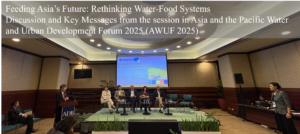Discussion and Key Messages from the session in Asia and the Pacific Water and Urban Development Forum 2025 (AWUF 2025)
Feeding Asia’s Future: Rethinking Water-Food Systems
The Asian Development Bank (ADB) held its flagship knowledge-sharing event, the Asia and the Pacific Water and Urban Development Forum 2025 (AWUF2025), from May 28 to 30, 2025, at ADB Headquarters in Manila, Philippines.
The forum brought together over 600 practitioners, policymakers, and experts from across the Asia-Pacific region to exchange insights and innovations on urgent water and urban development challenges. The in-person format fostered dynamic discussions and active networking throughout the event.
As part of the forum, the APWF Secretariat (Japan Water Forum)supported the session “Feeding Asia’s Future: Rethinking the Water-Food Nexus, “organized by ADB’s Agriculture, Food, and Rural Development Sector (AFNR)on May 29.
Asia and the Pacific lie at the center of the global food system—home to over half the world’s population but with just 28% of global renewable freshwater and 30% of cropland. The region now faces the combined pressures of water scarcity, climate change, and ecosystem degradation, posing serious risks to food security and rural livelihoods.
This session explored pathways to transform agrifood systems through water-smart, nature-based, and resilience-driven solutions, aiming to:
- Highlight transformative practices and policies that build water resilience into food systems.
- Promote a shift from water control to water cooperation, and from extractive agriculture to systems thinking based on ecological limits, circularity, and cultural values.
- Showcase innovations in financing, governance, and technology, including natural capital accounting, SME engagement, and digital solutions that strengthen adaptive capacity.
The session also built on discussions from the Planet Aqua: “Rethinking Our Home in the Universe” with Jeremy Rifkin and experts, including Dr. Qingfeng Zhang, Senior director, Agriculture, Food, Nature, and Rural Development, ADB, held on April 30, further deepening the dialogue on emerging challenges and future solutions at the intersection of water and food security in Asia.
Key Insights from the Session
1. Water Systems for Food and Nature: Keynote by Prof. Taikan Oki, University of Tokyo
Asia’s water–food–climate challenges are intensifying. While food security has improved since the 1960s, sustaining it through the 21st century will require a fundamental transformation of water systems to support both food production and ecosystem health.
Key Messages:
・Past Success Doesn’t Guarantee Future Security: The Green Revolution boosted yields, but these systems may not withstand future climate pressures.
・Famine is a Governance Issue: Water scarcity alone doesn’t cause famine—political instability and failed responses do. While famine deaths have fallen, the number of famine events remains unchanged.
・Climate Extremes Threaten Agricultural Resilience: Droughts and heatwaves now cut national cereal yields by 9–10%. Even high-income countries are vulnerable due to water-intensive farming.
・Impacts Will Be Uneven: Maize yields may fall sharply in tropical regions, while wheat and rice impacts will vary. Location-specific, adaptive strategies are essential.
・Inequality Drives Food Insecurity: Food prices have dropped globally, but household food security depends on income and access. Building livelihood resilience is as important as increasing food production.
2. Panel Discussion Highlights
Water is More Than an Input—It’s a Value System:
Water holds cultural, ecological, and economic significance. Beyond pricing, water must be valued in ways that respect local traditions, ecosystems, and community stewardship, as seen in Malaysia’s rice cultivation practices.
Systems Integration: From River Basins to Food Bowls:
Food security must account for ecological health—rivers, forests, and soils are integral. Sri Lanka’s cascade irrigation shows how restoring watersheds can deliver efficient and equitable water use downstream.
Innovating for Resilience:
・Armenia is modernizing irrigation, adopting climate-resilient crops, and investing in community reservoirs.
・ADB’s natural capital and ecosystem payment schemes align upstream and downstream water interests.
・Across Asia, there’s growing momentum to finance water-smart SMEs and embed nature-positive practices in national food plans.
The Food-Water Nexus is a Global Security Issue:
With 733 million people facing hunger and a similar number living in water-stressed regions—often the same communities—securing water is essential not just for food, but for health, ecosystems, and regional stability.
The Way Forward: One System, One Future
The speakers emphasized the urgent need for a systemic and integrated shift:
・From sectors to systems
・From short-term yields to long-term resilience
・From fragmented investments to cohesive, landscape-level planning, including basins
Success hinges on multi-stakeholder collaboration, encompassing government, communities, scientists, small and medium-sized enterprises (SMEs), and development partners. As ADB scales up its investments, ADB’s growing investments offer a unique opportunity to co-create a water- and food-secure future for Asia.
Closing Thought
Feeding Asia’s future begins with water, not just as a resource, but as the foundation of life, culture, and sustainable development. The challenge is not only technical or financial—it is human, ecological, and urgent. The time to act is now.

Program
| Moderator: Ms. Changhua Wu, APWF Governing Council Chair | |
|
|
|
| Setting the scene: ADB’s new Agriculture, Food, Nature, and Rural Development Sector, the water–food–nature nexus strategic imperative, and the role of water resilience for ADB’s new $40 billion food systems transformation ambition |
Mr. Qingfeng Zhang, |
|
|
|
| Keynote Speech: “Asia-Pacific Water Systems for Food and Nature” |
Mr. Taikan Oki, Professor, University of Tokyo Vice President, Japan Water Forum 2024 Stockholm Water Prize Laureate |
|
|
|
| Panel discussion: “From Control to Cooperation – Operationalizing the Water-Food-Nature Nexus” |
Ms. Nazik Jzmachyan
Mr. Lifeng Li, Director, Land and Water
Mr. Arjan Budding,
Ms. Gretchen Kalingi, Professor, Sichuan
Mr. Sanath Ranawana, Director, Natural |
|
|
|
| Q & A with participants and speakers | |
|
|
|
| Closing Remarks: Elevating the Asia-Pacific Water Forum toward a “Blue Planet Forum”—a platform for shared wisdom and collective action |
Ms. F. Cleo Kawawaki, Director General, |
(Reported by Yumiko Asayama, Chief Manager)
